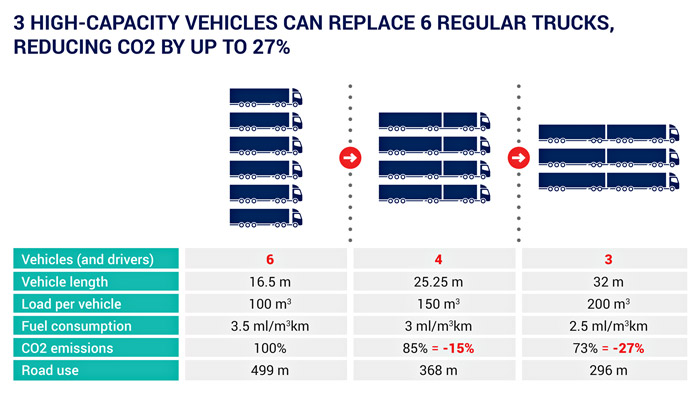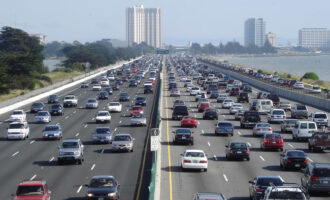
Truck makers call for EU-wide introduction of high-capacity vehicles to lower CO2 emissions
As part of wider efforts to reduce CO2 emissions from road transport, the European Automobile Manufacturers’ Association (ACEA) is calling for a policy framework that supports an EU-wide high-capacity transport system.
This should allow for high-capacity vehicles – specifically designed to carry twice as the amount of freight as standard trucks – to travel on dedicated parts of the EU road network. According to a new ACEA paper, three high-capacity vehicles can replace six regular trucks, reducing CO2 emissions by up to 27%.
The European Automobile Manufacturers’ Association is the Brussels-based trade association of the 15 major car, van, truck and bus producers in Europe. The ACEA commercial vehicle members are DAF Trucks, Daimler Trucks, IVECO, MAN Truck & Bus, Scania, Volkswagen Commercial Vehicles, and Volvo Group.
High-capacity vehicles in the form of European Modular System (EMS) combinations are already allowed in Belgium, Denmark, Finland, most of the German federal states, the Netherlands, Portugal, Spain and Sweden. In these countries, CO2 reductions have been confirmed in practice, ACEA said.
The EU’s first-ever CO2 standards for heavy-duty vehicles were recently fixed for the years 2025 and 2030. “Truck manufacturers are committed to doing their part to bring down emissions,” explained ACEA Secretary General, Erik Jonnaert. “However, these efficiency standards for new vehicles will not be enough to bring down total CO2 emissions from road transport.”
Demand for freight transport is expected to grow substantially over the next decades. High-capacity vehicles provide a cost-effective means of coping with this growing demand while keeping carbon emissions in check – without having to modify or extend Europe’s existing road infrastructure.
“In order to allow the benefits of high-capacity vehicles to be felt right across the entire EU, we urge policymakers to enable the introduction of a high-capacity transport system across borders,” Jonnaert said.
ACEA also called for harmonised requirements for such vehicles.









